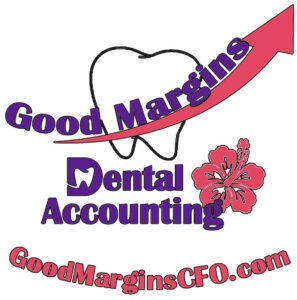Sponsored Content: Good Margins Dental Accounting
BY Michelle Lee, CFO, Good Margins Dental Accounting
Are you struggling to keep track of your finances and feeling overwhelmed? This is likely because you don’t have a budget in place. By sticking to a budget, your money will be allocated to where it needs to go, leaving room for more financial stability. As a result, you will feel more at ease when managing your business. Say goodbye to the chaotic and out-of-control feelings that come with not having a budget. Remember, budgeting means taking charge of your money and having a plan in place for running your business. Keep this in mind as you create your budget.
1. Set clear goals: Start with the end goal in mind. How much do you want to grow in the next year?
2. Be realistic: You should set realistic expectations when creating a budget. Operating a practice can sometimes be unpredictable, so it’s important to know where money can be moved within it.
3. Be flexible: Using up-to-date data allows you to be flexible and make adjustments to your budget when you realize something in your budget is not working. As a result, you can get an idea of where you stand right now, how much you can afford, and how much your practice is projected to earn in the future.
Five Steps to Budgeting
1. Look at historical data: When formulating your budget, consider the following factors:
- Increased revenues based on new patients
- Better collection percentages
- Decrease in clinical and office supply costs
- Salary increments for dentists and other staff
2. Creating a wish list of purchases will help improve the efficiency of your practice and boost your bottom line. Consider both the clinical and administrative aspects when planning this.
3. Investing in insurance and establishing clear policies allows your practice to focus on what it does best – care for patients.
4. Calculate projections for the upcoming year: You should be able to calculate projections for the upcoming year after assessing your variable and fixed expenses. When calculating your projections, keep the following in mind:
Your revenue – One of the first factors you must consider when calculating projections is your revenue forecast.
Your expenses – Once you have your revenue projected, you must make a list of all the expenses and how much they’ll cost you.
5. Monitor your Budget: To use budgets effectively, they must be reviewed and revised frequently. As an entrepreneur, you should make it a point to review your budget monthly.
Talk to Good Margins Dental Accounting about how “Win the Quarter, Month, Week and Day” can help you identify fluctuations and variances early to capitalize on opportunities and avoid pitfalls.
Michelle has extensive experience from junior level responsibilities to upper leadership positions. She has completed all the required CPA experience and education. Areas of experience include: A/R, credit & collections, A/P, general ledger, month-end close, financial statements, annual budgeting and forecasting, external audit management, statistical analysis of financial information, fraud and loss prevention, complex account reconciliation and accruals, inventory management, payroll processing, and benefits and human resources administration.
Michelle has been working in accounting for 30 years, five years being in the health service related industries. She holds a bachelor’s degree in Accounting and an MBA in Finance. She has held the titles of Director of Finance, CFO, and Controller in businesses ranging from a city municipality to construction to dental.







